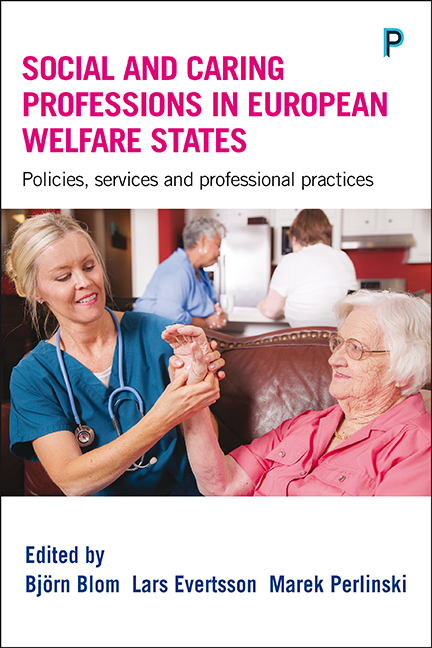 Social and Caring Professions in European Welfare States
Social and Caring Professions in European Welfare States Book contents
- Frontmatter
- Contents
- List of tables and figures
- Notes on contributors
- Preface
- one European social and caring professions in transition
- Part 1 Knowledge, reflection and identity in the social and caring welfare professions
- Part 2 Control, regulation and management
- Part 3 Collaboration, conflict and competition
- Part 4 Assessment, negotiation and decision making
- Index
Preface
Published online by Cambridge University Press: 05 April 2022
- Frontmatter
- Contents
- List of tables and figures
- Notes on contributors
- Preface
- one European social and caring professions in transition
- Part 1 Knowledge, reflection and identity in the social and caring welfare professions
- Part 2 Control, regulation and management
- Part 3 Collaboration, conflict and competition
- Part 4 Assessment, negotiation and decision making
- Index
Summary
In most countries in Europe, and in several other parts of the world, almost everyone has contact with social and caring welfare professionals at different stages of life. For example, most people have recurrent contact with physicians, but many also have contact with social workers or other social and caring professionals within in a social security system. It is fairly safe to say that such welfare professions in recent decades have become increasingly important for individuals as well as whole societies. Previous research on welfare professions has to a great extent focused on certain professional groups or professions in a specific country. This book intends to offer broader knowledge by presenting research-based knowledge on various aspects of social and caring welfare professions from a European perspective. It also wishes to offer detailed insights into welfare professionals’ daily work with clients and patients.
The Network for Comparative Research on Professions (N-CORP) was founded in spring 2010. It consists of researchers within the social sciences and medicine in a number of European countries. The network aims to contribute to the theoretical and empirical research on welfare professions, and to disseminate this knowledge within as well as outside academia. In light of these ambitions, the members of N-CORP decided to write this book.
Since the book is written by members of a network, it is largely the result of teamwork between the participating authors and editors. During several physical and computer-based meetings, we discussed focus and form concerning the book as a whole as well as individual chapters. The design of the book and the review of the content have thus largely been a joint process.
The book consists of four sections. Part 1 focuses on knowledge, reflection and identity in the social and caring welfare professions; Part 2 examines control, regulation and management; Part 3 discusses collaboration, conflict and competition; and Part 4 concentrates on assessment, negotiation and decision making. Taken together, the chapters within these four themes highlight and problematise key aspects of current European social and caring professions.
Whether you will read this book in its entirety, or choose to focus on individual chapters, it is appropriate to acknowledge that the authors are aware that social and caring welfare professions is a broad label for a wide range of occupations that perform a variety of tasks aimed at different groups of people with diverse needs and problems.
- Type
- Chapter
- Information
- Social and Caring Professions in European Welfare StatesPolicies, Services and Professional Practices, pp. xv - xviPublisher: Bristol University PressPrint publication year: 2017
